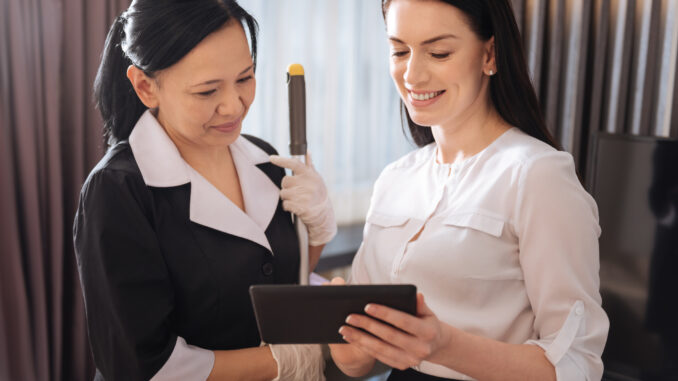
By Andrada Paraschiv, vice president of Hospitality for Beekeeper - 4.28.2022
The next wave of foreign nationals on H-2B Visas are arriving in the U.S. to fill vacant non-agricultural jobs. Some of those workers may choose to fill vacant frontline positions at hotels. While operators are desperate for help, hiring from overseas can cause additional issues for Human Resources teams and managers, especially if the labor is unskilled. Therefore, it’s important to be prepared. One of the best ways to make these valuable people as productive as possible — and without much investment from existing teams who are already stretched thin and facing burnout — is to leverage a mobile app for employee communication and collaboration.
Here are 5 ways digitalization will help integrate H-2B Visa workers into the hotel environment and make them feel more valued and part of the team:
It Helps Everyone Speak the Same Language — Those entering the U.S. on H-2B Visas are a multi-lingual workforce. Language barriers limit reach of communication, which negatively impacts operations and engagement. Hiring translators and individually translating important messages and documents drains resources, so utilizing automated translations is an increasingly popular option. A digital communication platform with “Inline Translations” for broadcast or one-on-one communications, forms or surveys will enable frontline workers to have all content translated in their preferred language with a simple click. The same translation technology supports the ability for multi-lingual employees to leave a voice message instead of typing. Inline Translation supports more than 100 languages, and it empowers every single employee to communicate with one another. It minimizes the overhead for management to make content accessible for employees of all backgrounds and raises productivity and engagement. Inline Translation also promotes workplace diversity and a strong corporate culture rooted in connectedness.
It Fosters Faster Onboarding and More Efficient Training — Time is our most valuable resource. When onboarding employees, especially temporary ones, being able to get them up to speed immediately is extremely important. Rather than printing off a training manual, hoteliers can send content digitally to give H-2B employees immediate access to what they need to know and something they can refer later on the job. For example, giving a housekeeper a task to clean a guestroom is great, but giving the person a digital room-cleaning checklist is better. Employees can check off every step in the room cleaning process. This gives employees confidence in knowing they are doing their jobs correctly without asking busy managers for help or guessing if they are doing tasks correctly – which can ultimately lead to service inconsistencies. In addition to checklists, reference videos on how to perform tasks are also vital in helping foreign nationals do their jobs without having to ask the manager for assistance.
It Helps People Engage and Feel Part of the Team. Those coming to the U.S. on H-2B Visas may be entering the U.S. for the first time. They likely feel isolated and alone. A digitalized communication platform is the ideal way to help employees feel more connected to the hotel, to their department, to management and co-workers. When you communicate directly with employees, it makes them feel good — like they are part of the hotel family or something much bigger than themselves. Without it, there is a gray area of uncertainty, and uncertainty breed’s mistrust. Even if there is nothing wrong, just being kept out of the loop threatens employee happiness. No hotel company big or small can afford to cultivate this type of negative atmosphere. By digitally connecting employees to management and each other, it gives them a voice … creates loyalty … and keeps everyone engaged.
It Provides a Forum for Employee Recognition and Reward. Recognition is a valuable employee retention strategy. Even if associates are on temporary H-2B Visas, you want them to give their best while here and potentially return in the future. Digital communication enables management to send shout-outs to high-performing employees, call out teams that went above and beyond, and showcase success stories. Individual recognition makes employees feel good about themselves, their co-workers and ultimately about the company. When employees are recognized (even those on temporary assignment) they want to do their best because they feel appreciated and understand that their work matters. Showcasing accomplishments and behavior to emulate can be very inspirational across the organization. It’s important that everyone has a way to see themselves and their peers being recognized. Simply dropping employee recognition in the monthly townhall meetings or the quarterly company newsletter often buries the news. Recognition must be part of an overall, active, and dynamic communication strategy.
It Supports Workplace Flexibility. Today’s workforce wants flexibility. According to Gartner, nearly half of frontline workers say they want more control over when, where, and how much they work. Digitalization promotes flexibility, especially when it comes to shift scheduling. While many U.S. employees clamor for more time off, those on temporary H-2B Visas may want to pick up as many shifts as possible to maximize income while they are here. A digital communication platform will give temporary employees access to schedules from anywhere and enable them to easily communicate with colleagues about switching or adding shifts. All of this brings workers closer to the work-life balance they desire, and it gives them reasons to want to return.
Diversity, equity and inclusion are key to attracting and retaining employees in any workplace, but these best practices are even more critical today in hospitality. The best way to attract and retain talent from across the globe — even if it is just temporary — is to equip every person across the organization with the digital tools they need to succeed. After all, managers have less time to train and support their staff. Technology is the ideal HR complement.
A digital employee communication platform is the lifeline hotel operators need to rebuild the workforce. It serves as a central hub for all frontline employees who need daily access to operational information, training and much more.
 Andrada Paraschiv is the vice president of Hospitality for Beekeeper, a mobile-first communication and collaboration platform that transforms the way hospitality frontline employees work. Previously, Andrada served as Executive Director, Luxury Internal Communications and Engagement at AccorHotels and Executive Director, Communications & Strategy at Fairmont Raffles Hotels International. Andrada also served as a consultant with McKinsey & Co., working on strategy and organizational transformations with large multinational companies in the EMEA region. She holds an MBA from the Wharton School and an MA in International Studies from University of Pennsylvania.
Andrada Paraschiv is the vice president of Hospitality for Beekeeper, a mobile-first communication and collaboration platform that transforms the way hospitality frontline employees work. Previously, Andrada served as Executive Director, Luxury Internal Communications and Engagement at AccorHotels and Executive Director, Communications & Strategy at Fairmont Raffles Hotels International. Andrada also served as a consultant with McKinsey & Co., working on strategy and organizational transformations with large multinational companies in the EMEA region. She holds an MBA from the Wharton School and an MA in International Studies from University of Pennsylvania.
Are you an industry thought leader with a point of view on hotel technology that you would like to share with our readers? If so, we invite you to review our editorial guidelines and submit your article for publishing consideration.
